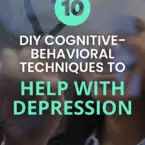
Feeling trapped in the grip of depression can be overwhelming, but it’s crucial to remember that you’re not alone in this fight. There are various strategies to help manage and alleviate symptoms of depression. One effective approach that has gained substantial traction in recent years is Cognitive Behavioral Therapy (CBT), a type of therapy that can be highly effective in treating depression.
CBT operates on the fundamental idea that our thoughts, feelings, and actions are interconnected, and that by changing negative thought patterns, we can alter our feelings and behaviors. The beauty of CBT is that many techniques can be practiced independently at home.
While not a substitute for professional help, these strategies can supplement treatment and help manage symptoms. Here are 10 DIY cognitive-behavioral techniques you can try to undepress yourself:
1. Identifying Negative Thought Patterns
The first step in CBT is becoming aware of the negative thought patterns that contribute to your depression. These could be self-critical thoughts, a focus on negatives while ignoring positives, or a tendency to catastrophize situations. By recognizing these patterns, you can start to challenge them.
2. Challenging Negative Thoughts
Once you’ve identified your negative thought patterns, start questioning them. Is there evidence that supports these thoughts? Are there alternative explanations or positive aspects you could focus on? By challenging these thoughts, you can start to shift your perspective.
3. Practice Mindfulness
Mindfulness is the practice of staying present and engaged in the current moment. It can help reduce depressive symptoms by shifting focus away from negative thoughts about the past or future. Try incorporating mindfulness practices like meditation or mindful eating into your daily routine.
4. Engage in Behavioral Activation
Depression often leads to a loss of interest in activities you once enjoyed. Behavioral activation involves making a concerted effort to engage in these activities, even if you don’t feel like it. This can help improve your mood and break the cycle of depression.
5. Use Problem-Solving Strategies
If specific problems are contributing to your depression, use problem-solving strategies to address them. This involves clearly defining the problem, generating potential solutions, evaluating and choosing a solution, and implementing it.
Related: 9 Nutritious Foods That Can Help You Dig Out of Depression >>
6. Practice Gratitude
Gratitude can shift your focus from negative aspects to positive ones. Try keeping a gratitude journal and each day write down a few things that you’re grateful for. Over time, this can help foster a more positive mindset.
7. Establish a Regular Sleep Schedule
Sleep disturbances can exacerbate symptoms of depression. Establishing a regular sleep schedule and practicing good sleep hygiene can help improve your mood and energy levels.
8. Physical Activity
Physical activity is a powerful mood booster. Try to incorporate some form of exercise into your daily routine. This doesn’t have to be anything strenuous – a walk around the block can be a good starting point.
9. Practice Self-Compassion
Be gentle with yourself. Practice self-compassion by speaking to yourself as you would to a good friend. When you’re feeling down, remind yourself that it’s okay to have bad days, and don’t beat yourself up over it.
More: 12 Self-Care Rituals to Help Pull Yourself Out of Depression >>
10. Seek Support
Remember, you don’t have to do this alone. Reach out to friends, family, or a mental health professional. Sharing your feelings with others can provide a sense of relief and make your struggles feel more manageable.
Final Thoughts
Cognitive-Behavioral Techniques have shown remarkable effectiveness in managing depression, and the beauty of these techniques is their accessibility. You can practice them right at home, turning them into daily habits that help improve your mental health.
However, remember that while these DIY techniques can help manage symptoms and are excellent self-care tools, they are not a substitute for professional help. Depression is a serious illness and often requires a combination of treatment methods.
If your symptoms persist or worsen, it’s crucial to reach out to a healthcare professional. Mental health professionals can provide the necessary guidance, treatment plans, and support that can be invaluable in managing depression.
Lastly, always remember: it’s okay not to be okay. It’s okay to reach out for help. You’re stronger than your depression, and with the right tools and support, you can overcome this. Always keep fighting, keep going, and know that you’re not alone in this journey.















